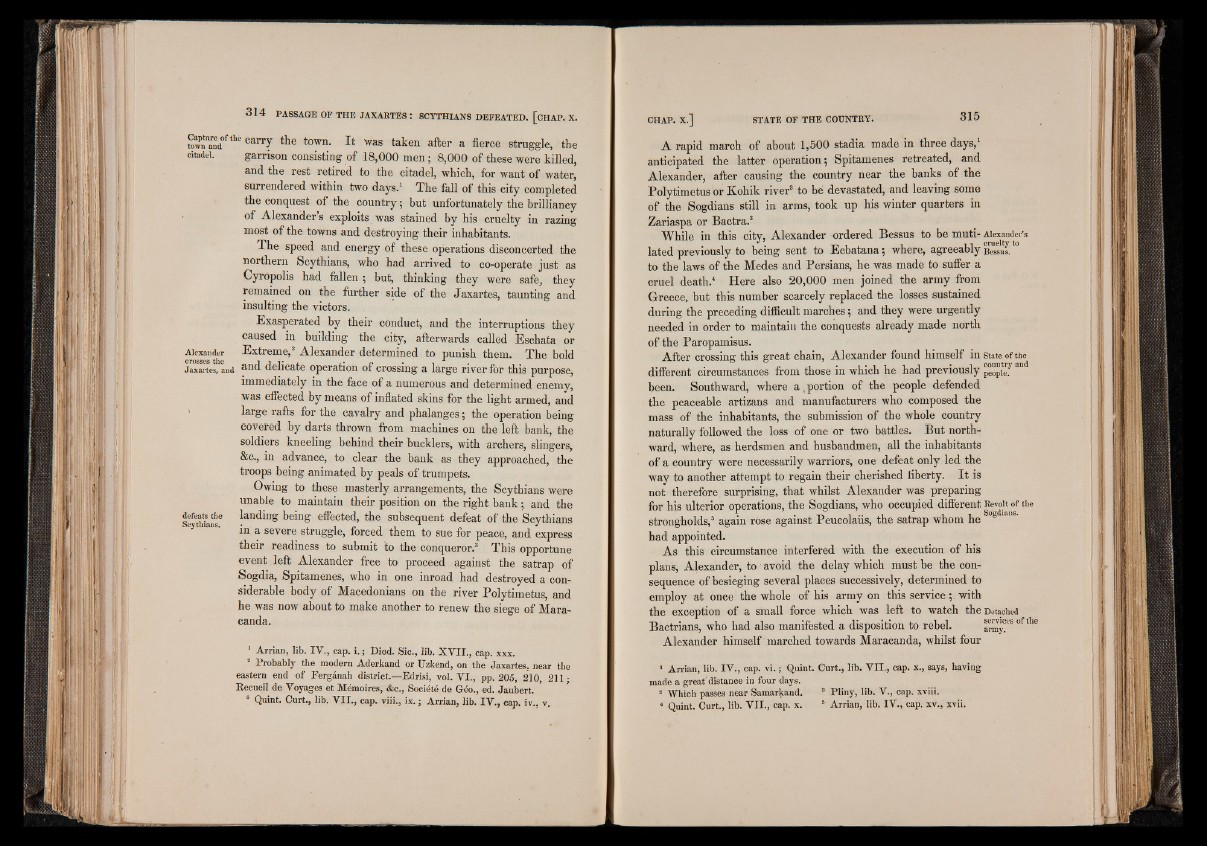
^ PnUarnd°fth e carry the town- 14 was taken after a fierce struggle, the
citadel. garrison consisting of 18,000 men ; 8,000 of these were killed,
and the rest retired to the citadel, which, for want of water,
surrendered within two days.1 The fall of this city completed
the conquest of the country ; but unfortunately the brilliancy
Alexander s exploits was stained by his cruelty in razing
most of the towns and destroying their inhabitants.
The speed and energy of these operations disconcerted the
northern Scythians, who had arrived to co-operate just as
Cyropolis had fallen ; but, thinking they were safe, they
remained on the further side of the Jaxartes, taunting and
insulting the victors.
Exasperated by their conduct, and the interruptions they
caused in building the city, afterwards called Eschata or
Alexander Extreme,2 Alexander determined to punish them. The bold
Jaxartes, and and delicate operation of crossing a large river for this purpose,
immediately in the face of a numerous and determined enemy,
was effected by means of inflated skins for the light armed, and
large rafts for the cavalry and phalanges ; the operation being
covered by darts thrown from machines on the left bank, the
soldiers kneeling behind their bucklers, with archers, slingers,
&c., in advance, to clear the bank as they approached, the
troops being animated by peals of trumpets.
Owing to these masterly arrangements, the Scythians were
unable to maintain their position on the right bank ; and the
sfaTans6 knding effected, the subsequent defeat of the Scythians
in a severe struggle, forced them to sue for peace, and express
their readiness to submit to the conqueror.3 This opportune
event left Alexander free to proceed against the satrap of
Sogdia, Spitamenes, who in one inroad had destroyed a considerable
body of Macedonians on the river Polytimetus, and
he was now about to make another to renew the siege of Mara-
canda.
Arrian, lib. IV ., cap. i. ; Diod. Sic., lib. X V I I ., cap. xxx.
Probably the modern Aderkand or Uzkend, on the Jaxartes. near the
eastern end o f Fergànah district.—Edrisi, vol. V I., pp. 205, 2Ì0 , 211 -
Recueil de Voyages et Mémoires, &c., Société de Gèo., ed. Jaubert.
3 Quint. Curt., lib. V I I ., cap. viii., ix. ; Arrian, lib. IV ., cap. iv., v.
A rapid march of about 1,500 stadia made in three days,1
anticipated the latter operation; Spitamenes retreated, and
Alexander, after causing the country near the banks of the
Polytimetus or Kohik river2 to be devastated, and leaving some
of the Sogdians still in arms, took up his winter quarters in
Zariaspa or Bactra.3
While in this city, Alexander ordered Bessus to be muti- Alexander's
lated previously to being sent to Ecbatana; where, agreeably Bessus.
to the laws of the Medes and Persians, he was made to suffer a
cruel death.4 Here also 20,000 men joined the army from
Greece, but this number scarcely replaced the losses sustained
during the preceding difficult marches; and they were urgently
needed in order to maintain the conquests already made north
of the Paropamisus.
After crossing this great chain, Alexander found himself in state of the
different circumstances from those in which he had previously pe0pief
been. Southward, where a |portion of the people defended
the peaceable artizans and manufacturers who composed the
mass of the inhabitants, the submission of the whole country
naturally followed the loss of one or two battles. But northward,
where, as herdsmen and husbandmen, all the inhabitants
of a country were necessarily warriors, one defeat only led the
way to another attempt to regain their cherished liberty. It is
not therefore, surprising, that whilst Alexander was preparing
for his ulterior operations, the Sogdians, who occupied different Revolt of the
. • t» i strongholds,5 again rose against Peucolau•• s, itih e satrap wih_ om ih e Sogdians.
had appointed.
As this circumstance interfered with the execution of his
plans, Alexander, to avoid the delay which must be the consequence
of besieging several places successively, determined to
employ at once the whole of his army on this service with
the exception of a small force which was left to watch the Detached
Bactrians, who had also manifested a disposition to rebel. armj-&S of tlle
Alexander himself marched towards Maracanda, whilst four
1 Arrian, lib. IV ., cap. v i . ; Quint. Curt., lib. V I I ., cap. x., says, having
made a great'distance in four days.
2 Which passes near Samarkand. 3 Pliny, lib. V., cap. xviii.
4 Quint. Curt., lib. V I I ., cap. x. 5 Arrian, lib. IV ., cap. xv., xvii.